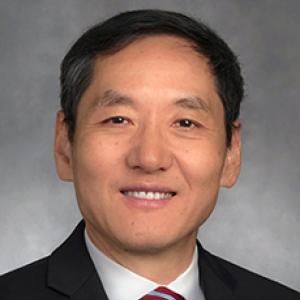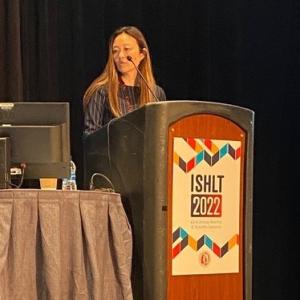Dr. Glass Invited to Brigham and Women’s Hospital, Division of Computational Pathology
Carolyn Glass, MD, PhD, was invited to visit with PhD students, post-doctorate and clinical fellows from Harvard University, Massachusetts Institute of Technology, and Brigham and Women’s Hospital during a two-day visit on April 28-29, 2022, to Boston.
Dr. Jones Assumes Muscle & Nerve Pathology Section Head Role
We are pleased to announce that Karra Jones, MD, PhD, was appointed as Section Head of Muscle and Nerve Pathology on May 16, 2022, shortly after joining
Dr. Wang Appointed to NIH Cancer Molecular Pathobiology Study Section
Qianben Wang, PhD, has accepted an invitation to serve as a member of the National Institutes of Health (NIH) Cancer Molecular Pathobiology Study Section (CAMP), Center for Scientific Review (CSR), for a term from July 1, 2022, to June 30, 2026.
Dr. Wang’s LATE Research Published
Shih-Hsiu “Jerry” Wang’s, MD, PhD, latest paper on LATE (Limbic-predominant TDP-43 encephalopathy) was published in Acta Neuropathologica on May 12.
Dr. Jiang Awarded DOD Grant
The Department of Defense awarded a Prostate Cancer Research Program’s Early Investigator Research Award to Xue Jiang, PhD, a postdoctoral fellow in Jiaoti Huang’s, MD, PhD, research laboratory.
Dr. Huang lectures at University of Kansas
Jiaoti Huang, MD, PhD, spoke at an in-person joint Pathology-Urology Grand Round on May 2, 2022, at the University of Kansas.
Dr. Karra Jones Joins Faculty
We are so proud of our Alumnus, Pakawat "Nick" Chongsathidkiet, a graduate from Duke’s Pathology PhD Graduate program in 2020 who recently matched into the Duke Neurosurgery residency program starting June 2022.
Dr. Glass Presents at ISHLT Annual Meeting
Carolyn Glass, MD PhD, gave a presentation titled “Lessons Learned: COVID-19 and Cardiac Transplant Pathology” at the 2022 International Society for Heart & Lung Transplantation (ISHLT) Annual Meeting held in Boston, MA, April 27-30.
Jorge Santana-Santini Awarded for Research on Therapeutic Treatments for Brain Tumors
Jorge Santana-Santini, a research technician in Giselle López’s, MD PhD, lab, was recently awarded the Geographic Management of Cancer Health Disparities Program (GMaP) Region 1 South Professional Development and Research Stimulus Award!
Pakawat (Nick) Chongsathidkiet Returns to Duke for Neurosurgery Residency
We are so proud of our Alumnus, Pakawat "Nick" Chongsathidkiet, a graduate from Duke’s Pathology PhD Graduate program in 2020 who recently matched into the Duke Neurosurgery residency program starting June 2022.









